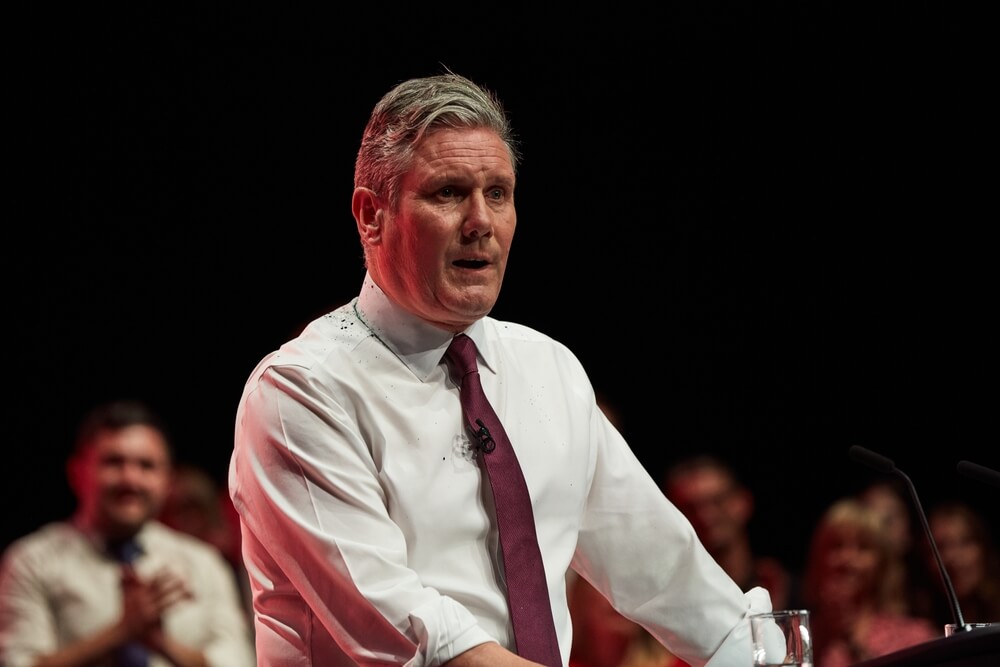Britain’s ruling Conservative party is entering a problematic election year with progress on a manifesto goal of securing a free trade agreement with the United States now effectively frozen.
Trade may not be top of the list of concerns as British voters head to the polls, probably in the autumn. But the current impasse between London and Washington reinforces public disillusionment with the promised benefits of leaving the European Union.
Ahead of the last general election in 2019, the governing party manifesto said a Conservative government would aim to have 80 per cent of UK trade covered by free trade agreements within three years, with a US deal topping the list.
More than seven years since the EU referendum, and exacty four since the last general election, the ruling party has little to show for its manifesto optimism.
A key question for 2024, however, is not so much whether the present government has failed on the US trade issue but whether the opposition Labour party, heavily forecast to replace it within months, can be expected to do any better.
Britain's hopes
Senior Labour figures have been criss-crossing the Atlantic in recent months to enhance their relationship with President Joe Biden’s administration. But, if and when Labour leader Keir Starmer takes over in Downing Street, he could find himself facing Donald Trump across the negotiating table.
Trump at least paid lip service to the benefits of a UK-US free trade deal during his first term. Congratulating then prime minister Boris Johnson on his 2019 victory, Trump said Brexit meant the two countries were now free to strike a “massive” trade deal.
Britain’s hopes were rapidly dented when Biden replaced Trump in the White House and ruled out “any new trade agreement with anybody” ahead of major investments at home.
The UK has fallen back on the option of reaching more modest trade and investment agreements with individual US states - seven so far - but these lack the heft of a comprehensive deal with the federal government.
The partnership plan fell far short of a full trade agreement
With prospects for a full-on trade pact effectively dead, the government of Rishi Sunak also focussed on talking up the benefits of a more limited deal, outlined in October as a ‘foundational trade partnership’, following the signing months earlier of the high-sounding UK-US Atlantic Declaration.
The limited aims of the foundational initiative were to coordinate and cooperate on trade policy issues of mutual interest and to further deepen existing ties with the UK’s largest trading partner.
The partnership plan fell far short of a full trade agreement. Even the UK business secretary Kemi Badenoch conceded at the time that there was “zero” chance of a full-scale trade deal with the US while Biden remained in the White House.
Progress would nevertheless still have offered Sunak some positive headlines ahead of the UK’s 2024 election.
A retreat from globalisation
Now, however, Biden is reported to have shelved plans to secure agreement ahead of the November election for the presidency, according to unnamed sources quoted by the online journal Politico.
That would mean that all progress on trade is effectively frozen until new administrations are in office in both London and Washington.
Politicians and commentators on the right are already pitching the benefits of having Trump back in the White House if there is to be any hope of keeping alive the promise of an eventual free trade deal.
Whether it is Trump or Biden, it may just be that the UK has missed the boat when it comes to securing a comprehensive trade deal. A retreat from globalisation and towards greater protectionism and subsidies, including in the US, might mean that the era of bilateral megadeals is over.
Public support for such deals may, in any event, be waning.
 If the coming year delivers election victory to both Starmer and Biden, Labour has said it would be poised to sign a series of trade agreements with the US
If the coming year delivers election victory to both Starmer and Biden, Labour has said it would be poised to sign a series of trade agreements with the US
The British fret that a deal with the US might undermine their cherished food and animal safety standards, or lead to a backdoor privatisation of the state-run health service.
Americans, their current government included, baulk at any deal that does not directly benefit American workers or which threatens the prospects of the automobile or other industries.
If the coming year delivers election victory to both Starmer and Biden, Labour has said it would be poised to sign a series of trade agreements with the US. That holds the promise of closer cooperation but does not automatically revive the prospects of a full-on trade deal.
After all, Labour leaders such as shadow chancellor Rachel Reeves are firm fans of ‘Bidenomics’, with its focus on more direct intervention in markets. As Reeves declared on a visit to Washington this year: “Globalisation as we once knew it is dead.”
Sunak theoretically still has up to a year to pull a trade rabbit out of the hat. But, even before the latest negative signal from Biden, it was not looking good.
The bald prose of a November briefing report to parliament perhaps best sums up the immediate road ahead: “There is no current trade agreement between the UK and the US…An agreement is not expected soon.”